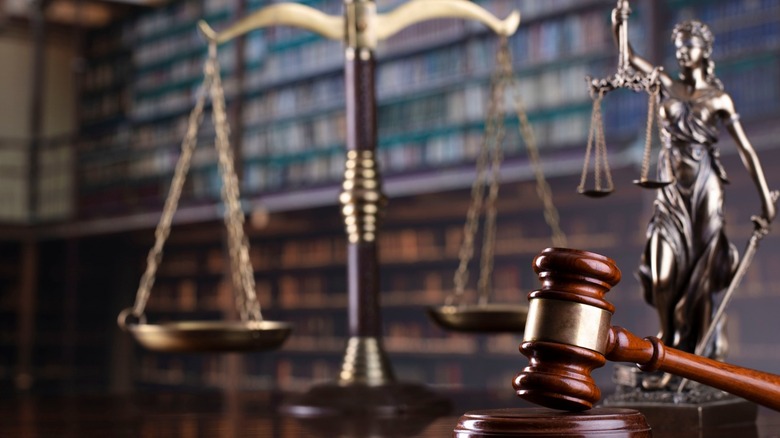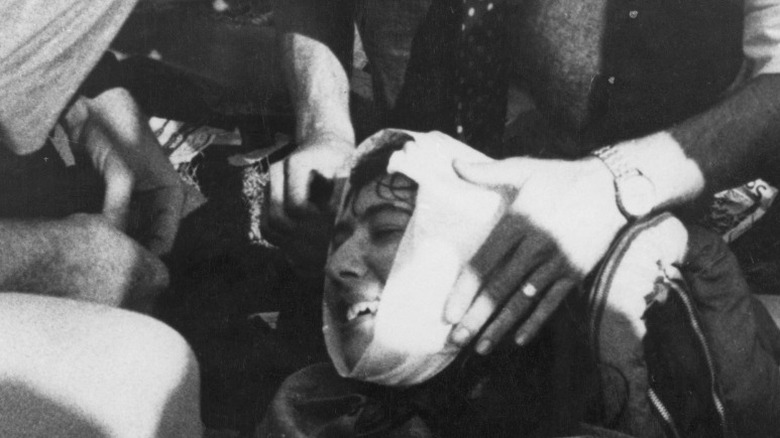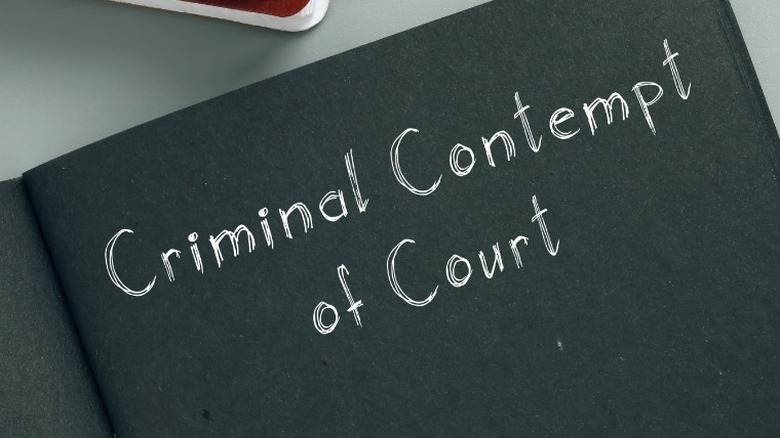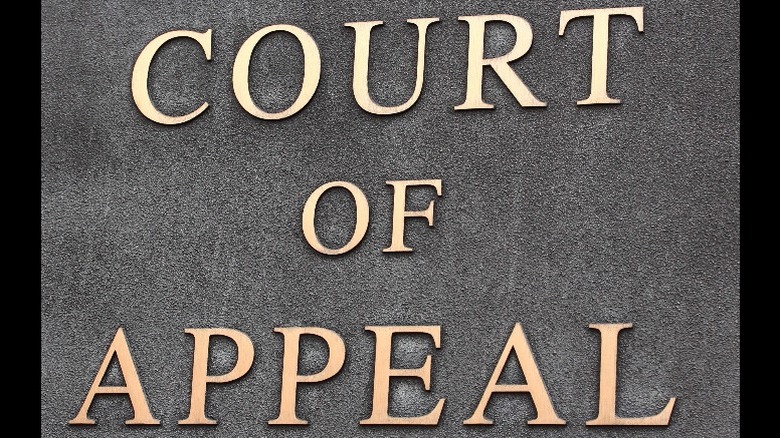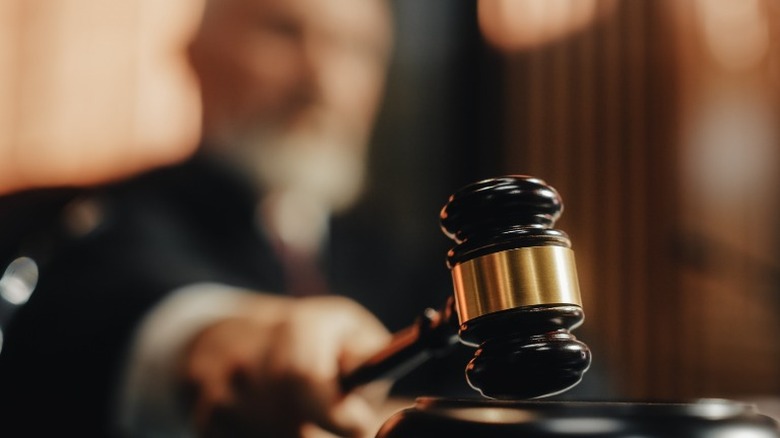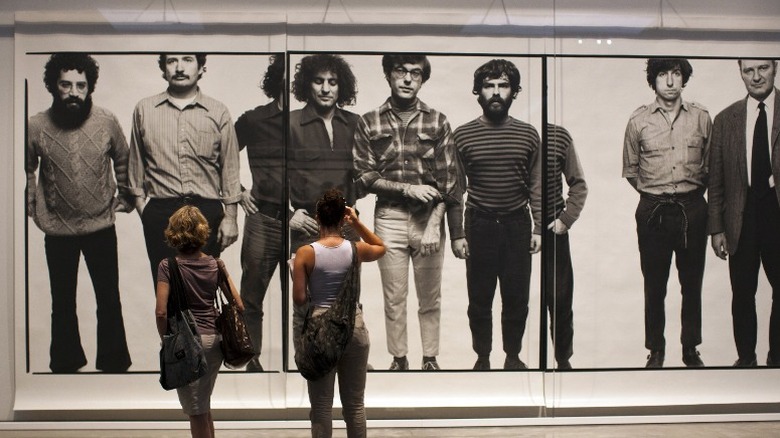What Happened To Judge Julius Hoffman After The Chicago 7 Trial?
The trial of the Chicago Seven in late 1970 could be considered the peak of the anti-war movement. Though all of the defendants were eventually found not guilty by a federal appeals court, Judge Julius Hoffman sentenced five of the parties found guilty in his court to the maximum five years in prison, via Vulture. The trial itself was a circus, with the behavior of many in the courtroom from both sides being considered an embarrassment to our legal system.
Judge Hoffman was recently portrayed in the 2020 film "The Trial of the Chicago Seven" by veteran actor Frank Langella (per IMDb). With a cast that included Oscar nominee Sacha Baron Cohen as co-defendant Abbie Hoffman (no relation to the judge), the film was a critical and commercial success.
The presiding judge was also played by the late actor Roy Scheider in the 2007 documentary "Chicago 10," in which the actor provided Hoffman's voice during the animated courtroom scenes (via IMDb).
Hoffman had a storied career on the federal bench before the trial that he would become most known for. He was the presiding judge who handed down the first-ever desegregation order from the Northern Federal Court (per The New York Times). He also presided over that court's longest-running trial, a case against a supposed cancer cure called Krebiozen in 1966 (via The New York Times). However, Hoffman's career did not begin with the Chicago Seven Trial and it certainly did not end there.
The trial of the Chicago Seven was Hoffman's most notorious case
The trial that Judge Hoffman remains most known for stems from an event in 1968 that became a symbol of young Americans rising up and protesting their country's involvement in the Vietnam War. During the Democratic National Convention that summer, held in Chicago that year, activists against the war grew more and more aggravated at the Democratic Party's inevitable nomination of Hubert Humphrey on the top of the party ticket for the November presidential election. In response, a "counter convention" was held elsewhere in Chicago as a way to protest a candidate that many youthful members of the party thought was out of touch with the peace movement.
The Youth International Party (yippies) organized a massive protest of the Democratic National Convention, pairing it with their mock convention in which they nominated a pig for President of the United States. Tens of thousands of protestors joined the yippies and their leader Abbie Hoffman at Griffith Park, in Chicago. What began as a peaceful protest turned into a nightmare for attendees as Mayor Daily ordered his police force to disrupt the protest. Attendees were beaten and tear-gassed. The National Guard was later called in, leading to the arrest of Hoffman and nearly 650 other individuals (via History).
Abbie Hoffman and seven other defendants would find themselves in Judge Hoffman's courtroom on federal charges of crossing state lines to incite a riot. After co-defendant Bobby Seale was ordered bound and gagged by Judge Hoffman in the courtroom for his behavior, he was ordered to be tried separately. The remaining defendants were known as "The Chicago Seven," and would be a part of a lengthy trial that would mar Judge Hoffman's reputation on the bench for the rest of his life.
The Chicago Seven Trial harmed the judge's reputation
After the Chicago Seven trial ended, five of the seven defendants were found guilty. Two of those in Judge Julius Hoffman's courtroom, John Froines and Lee Weiner, were acquitted (per The New York Times).
The guilty were Abbie Hoffman, Jerry Rubin, Rennie Davis, David Dellinger, and Tom Hayden. They faced some serious jail time for the federal charge. In addition, Judge Hoffman slapped a grand total of 181 contempt of court charges against all seven defendants and their two attorneys. In a rare move, Judge Hoffman ordered attorneys William Kunstler and his co-counsel, Leonard I. Weinglass, to serve jail time for their own contempt charges. The men were sentenced to serve four years and 20 months, respectively.
The defendants appealed Judge Hoffman's verdict successfully. In addition, only 13 of the 181 charges of contempt handed down by Hoffman were allowed to stand. This resulted in neither the defendants nor their attorneys serving any jail time. Seale, who was to be tried in a separate trial, was never ordered to appear in court over this matter again.
While the behavior of the Chicago Seven in the courtroom would have tried the patience of most anyone on the bench, Hoffman's response to it was detrimental to his reputation. The appeals court made rulings nine months after the original trial that made the judge look arguably worse than the defendants in his courtroom.
Judge Julius Hoffman's rulings were overturned in the appeals court
The United States Court of Appeals ruled that Judge Hoffman made serious procedural errors during the pre-trial and trial processes (per The New York Times). In their opinion, they stated that Hoffman should have allowed for certain defense witnesses to testify, namely former U.S. Attorney General Ramsey Clark. They admonished Judge Hoffman for his demeanor in the courtroom, including his passage of notes to the jury without the defendants' awareness and his failure to allow for the elimination of jurors who had prejudices (via Famous Trials).
In what could be viewed as a stinging response to the original trial, the appellate court wrote that Hoffman had a "deprecatory and often antagonistic attitude toward the defense." Hoffman showed a blatant amount of hostility toward the defense attorneys throughout the trial, which was argued skewed the jurors. "The demeanor of the judge would require reversal even if errors did not," the appeals court wrote (per The New York Times).
The court of appeals also found that Judge Hoffman was aware that the FBI had illegally wiretapped the offices of the defense attorneys. Despite this monumental reversal, Hoffman remained on the bench after the appeals court rendered its decision on November 21, 1972.
Judge Hoffman presided over the trial of an accused Nazi war criminal
Judge Julius Hoffman became a senior judge in 1972, not long after his courtroom failings during the Chicago Seven Trial, according to The New York Times. In this capacity, he would eventually oversee civil court cases that were filed with the United States government. Before he took up this role, Hoffman did preside over one other higher profile case: The case of Polish immigrant Frank Walus, who was an accused Nazi war criminal. Walus was convicted but later had that conviction overturned, as The Washington Post writes.
Until his death in 1983, Judge Hoffman worked in the same federal building that housed the very courtroom that his time on the bench was most famous for. Even after the years began to tick past the Chicago Seven Trial, the opinion that fellow judges and attorneys had of the judge were varied. In his obituary with The New York Times, Hoffman was said to have been "one of the most distinguished members of our court." These remarks were made by Ralph J. McGarr, Chief Judge of the Federal District Court for the Northern District of Illinois.
But, others didn't look at Hoffman's tenor quite as fondly. He was known to be inattentive on the bench in his last decade. Attorneys would remark that his behavior and rulings were often erratic, and he could sometimes be abusive with his role.
Hoffman resisted all pressure to retire from his position, however. In the months leading up to his death, he was not assigned any new cases by the presiding judge. One of his last duties from the bench was to preside over a naturalization ceremony for 150 new U.S. citizens.
Judge Hoffman was not apologetic about his courtroom behavior
During the trial of Abbie Hoffman and the other Chicago Seven defendants, Judge Hoffman remained resolute about his rulings, contempt of court charges, and his overall handling of the case. In a 1982 interview, he was quoted as saying "I just did what I perceived to be the right thing. I did nothing in the trial that I'm not proud of. I presided with dignity. When I felt I had to be firm, I was firm," (via Vulture).
When questioned about his behavior and alleged bias against the defense attorneys for that trial, Hoffman was equally without any regret. He remarked that the trial was important ”because we let certain kinds of lawyers know there are certain kinds of things you don't do when you're trying a lawsuit in the highest trial court in the land,” as The New York Times writes. Judge Julius Hoffman died on July 1, 1983, in his home.
